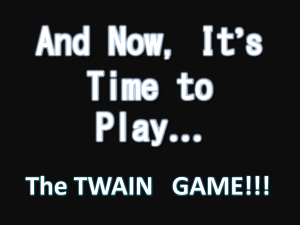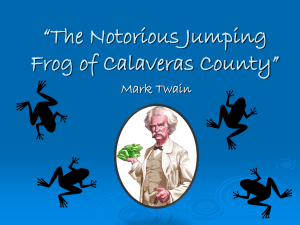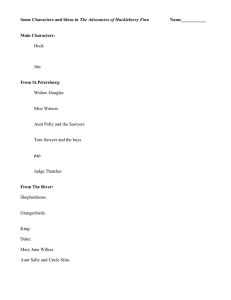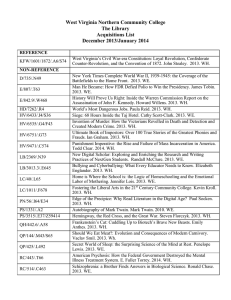Mark Twain’s Guide to Diet, Exercise, Beauty, Fashion, Investment, Romance,... Happiness -- A Two-Person Show
advertisement
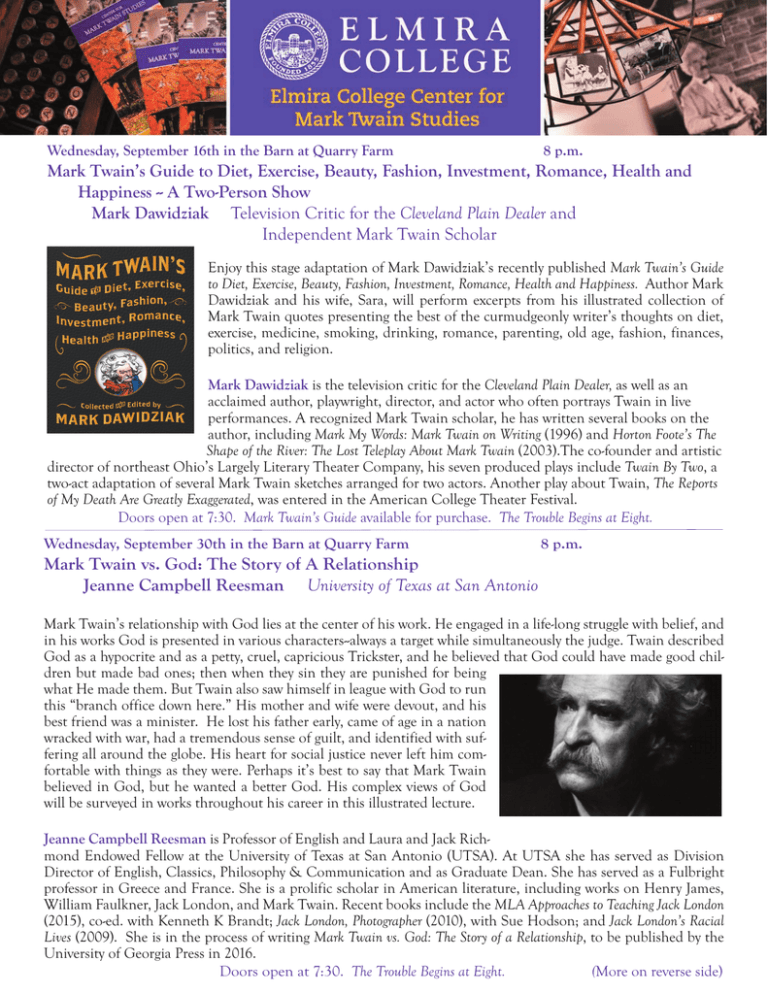
Wednesday, September 16th in the Barn at Quarry Farm 8 p.m. Mark Twain’s Guide to Diet, Exercise, Beauty, Fashion, Investment, Romance, Health and Happiness -- A Two-Person Show Mark Dawidziak Television Critic for the Cleveland Plain Dealer and Independent Mark Twain Scholar Enjoy this stage adaptation of Mark Dawidziak’s recently published Mark Twain’s Guide to Diet, Exercise, Beauty, Fashion, Investment, Romance, Health and Happiness. Author Mark Dawidziak and his wife, Sara, will perform excerpts from his illustrated collection of Mark Twain quotes presenting the best of the curmudgeonly writer’s thoughts on diet, exercise, medicine, smoking, drinking, romance, parenting, old age, fashion, finances, politics, and religion. Mark Dawidziak is the television critic for the Cleveland Plain Dealer, as well as an acclaimed author, playwright, director, and actor who often portrays Twain in live performances. A recognized Mark Twain scholar, he has written several books on the author, including Mark My Words: Mark Twain on Writing (1996) and Horton Foote’s The Shape of the River: The Lost Teleplay About Mark Twain (2003).The co-founder and artistic director of northeast Ohio’s Largely Literary Theater Company, his seven produced plays include Twain By Two, a two-act adaptation of several Mark Twain sketches arranged for two actors. Another play about Twain, The Reports of My Death Are Greatly Exaggerated, was entered in the American College Theater Festival. Doors open at 7:30. Mark Twain’s Guide available for purchase. The Trouble Begins at Eight. Wednesday, September 30th in the Barn at Quarry Farm 8 p.m. Mark Twain vs. God: The Story of A Relationship Jeanne Campbell Reesman University of Texas at San Antonio Mark Twain’s relationship with God lies at the center of his work. He engaged in a life-long struggle with belief, and in his works God is presented in various characters--always a target while simultaneously the judge. Twain described God as a hypocrite and as a petty, cruel, capricious Trickster, and he believed that God could have made good children but made bad ones; then when they sin they are punished for being what He made them. But Twain also saw himself in league with God to run this “branch office down here.” His mother and wife were devout, and his best friend was a minister. He lost his father early, came of age in a nation wracked with war, had a tremendous sense of guilt, and identified with suffering all around the globe. His heart for social justice never left him comfortable with things as they were. Perhaps it’s best to say that Mark Twain believed in God, but he wanted a better God. His complex views of God will be surveyed in works throughout his career in this illustrated lecture. Jeanne Campbell Reesman is Professor of English and Laura and Jack Richmond Endowed Fellow at the University of Texas at San Antonio (UTSA). At UTSA she has served as Division Director of English, Classics, Philosophy & Communication and as Graduate Dean. She has served as a Fulbright professor in Greece and France. She is a prolific scholar in American literature, including works on Henry James, William Faulkner, Jack London, and Mark Twain. Recent books include the MLA Approaches to Teaching Jack London (2015), co-ed. with Kenneth K Brandt; Jack London, Photographer (2010), with Sue Hodson; and Jack London’s Racial Lives (2009). She is in the process of writing Mark Twain vs. God: The Story of a Relationship, to be published by the University of Georgia Press in 2016. Doors open at 7:30. The Trouble Begins at Eight. (More on reverse side) Wednesday, October 7th in the Barn at Quarry Farm 8 p.m. Searching for the Ornithorhynchus: Mark Twain and Animal Conservation Susan K. Harris Susan Harris has been pursuing Mark Twain around the world, tracking themes that he starts in his last travelogue, Following the Equator. Twain’s observations about animal extinction in Australasia led her first to wildlife refuges and then into the library—where she began exploring the many philosophies of wildlife conservation today. “Searching for the Ornithorhynchus” (the Latin word for platypus, a particular favorite of Twain’s) starts with Twain in the Adelaide zoo, marches us through New Zealand and South Africa, and ends with questions about animal conservation—by whom, and for whose benefit. Susan K. Harris has recently retired from a position as the Joyce and Elizabeth Hall Distinguished Professor of American Literature and Culture at the University of Kansas. During her academic career she specialized in both Mark Twain Studies and in Studies of American Women Writers. Her writings include the monographs Mark Twain’s Escape from Time: A Study of Patterns and Images (1982), 19th-Century American Women’s Novels: Interpretive Strategies (1990), The Courtship of Olivia Langdon and Mark Twain (1996), The Cultural Work of the late 19th-Century Hostess: Annie Adams Fields and Mary Gladstone Drew (2002), and God’s Arbiters: Americans and the Philippines, 1898-1902 (2011). She has edited three 19th-century American women’s novels for Penguin/Putnam Press, as well as the Library of America’s volume of Twain’s historical romances and a Houghton Mifflin pedagogical edition of Adventures of Huckleberry Finn. From Following the Equator Doors open at 7:15. Enjoy light refreshments preceding the lecture. The Trouble Begins at Eight. Monday, November 30th in Cowles Hall on the Elmira College Campus 7 p.m. Mark Twain’s 180th Birthday Celebration [NOTE TIME AND LOCATION OF THIS LECTURE] Fraternizing With the Enemy: Revisiting Mark Twain’s Writings For, and About, Children Andrew Levy Butler University Mark Twain has long been celebrated for his books and stories for, and about, youth. But in the past two decades, new approaches among scholars, readers, and publishers to literature written for children have given us new lenses with which to see just how rich and forward-looking his perceptions of childhood and child-rearing in America really were. Andrew Levy is Edna Cooper Professor of English at Butler University, where he also chairs the English Department and recently directed the MFA program. He is author of the critically acclaimed Brain Wider Than the Sky, the award-winning biography The First Emancipator, and most recently, Huck Finn’s America. His essays have appeared in Harper’s, American Scholar, and Best American Essays, and his work has been reviewed in Time, the New York Times, NPR, and many other national venues. Photo courtesy of the Mark Twain House; Hartford, CT. Birthday cake and punch to follow lecture. Huck Finn’s America available for purchase and signing. Directions to Quarry Farm for Local Attendees From Elmira College, head east on Washington across the Clemens Center Parkway to Sullivan Street. Turn right on Sullivan. Turn left on East Avenue. Turn left on Crane Road. Quarry Farm will be on your left. Please park on the grassy area behind the Barn. Quarry Farm is a fragile environment. Exercise care. For GPS: 131 Crane Road Elmira, NY 14901 Directions to Cowles Hall on the Elmira College Campus Parking is available along Washington Avenue as well as in the lot east of Cowles Hall. Consult the web at http://www.elmira. edu/admissions-aid/Visit/Campus_Map.html Elmira College Center for Mark Twain Studies (607) 735-1941 twaincenter@elmira.edu Director Dr. Barbara E. Snedecor Secretary Trish Cordell Quarry Farm Caretaker Steve Webb
